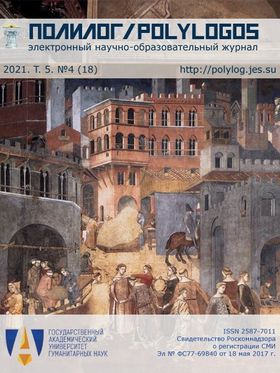
Share
In the fourth issue of the «Полилог/Polylogos» journal for 2021, articles published provide a wide range of problems of socio-humanitarian knowledge. The authors turned to philosophy, theory and philosophy of politics, philosophy of culture, topical problems of the history of modern international relations, and other.
DSc Mikhail Loktionov in his article examines the philosophical heritage of the famous Russian and Soviet scientist Alexander Bogdanov through the prism of theory and methodology of knowledge. CSc Svetlana Ilyinskaya analyzes the key ideological oppositions and the 3rd stage of theoretical understanding of the concept of "civilization" in its local (otherwise, "context-related") sense. Nikolay Chizhkov continues the theme started by the authors of the journal in previous issues, the problem of the social ideal in Russian philosophical and socio-political thought - by analyzing the dispute of Karamzin and Speransky about two ways of forming such an ideal in Russia. DSc Maria Rakhmaninova addresses a topic that has been poorly studied in the context of domestic social pedagogy: libertarian pedagogy as a project of non-hierarchical organization of educational, cognitive and educational processes. The subject of the article by CSc Ekaterina Aristova is the broadcasting the image of collectivization in Soviet cinema of the 1930s. for example, films by Eisenstein, Aleksandrov, Dovzhenko, Ermler and other film directors. Valentina Omelaenko analyzes the phenomenon of social self-organization in Russian society at the end of the 19th – beginning of the 20th centuries. on the example of the Moscow Law Society, created in the 1860s.
CSc Natalya Emelyanovf and Victor Denisenko, in his article, examines the specifics of the socio-political modernization of the countries of South Asia in the context of the correlation of values with the understanding of modernity and social progress for the South Asian subcontinent. CSc Arthur Avakov notes that after the collapse of the Soviet Union, political, economic and economic ties between the new interests remained, and interest is the nature of the republican integration processes in the post-Soviet space, their achievements and related problems. Zhanna Losich, in turn, explores the symbolic meaning of Nagorno-Karabakh in the context of Armenian and Azerbaijani nationalism in the post-Soviet period. DSc Vladimir Osipov, CSc Artyom Kosorukov, CSc Alexander Voronov turn to the problem of the behavior of public institutions under conditions of social upheaval. Alana Monteiro Rego and Marianna de Oliveira Rodrigues note in their article that against the background of global environmental problems, such as the melting ice of the Arctic Ocean, the theory of geopolitics is of interest and needs revision.
The issue also contains an article by CSc Denis Letnyakov, which is a review of two collective monographs: a collection dedicated to the 30th anniversary of anti-communist revolutions in Central and Eastern Europe (The Long 1989. Decades of the Global Revolution. Edited by P.Kh. Kositsky and K. Kunakhovich. Budapest, New York: CEU Press, USA). 2019) and the book, the release of which was timed to coincide with the 30th anniversary of the collapse of the Soviet Union – "European Dialogue" (Dismantling communism. Three years later / Ed. K. Rogov. M .: UFO, 2021).
